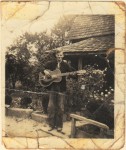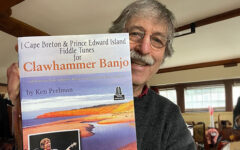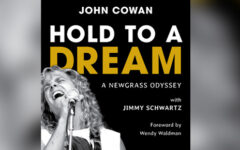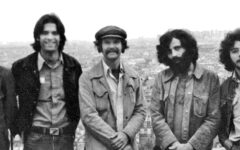 Many musicians have carved out their own niches in folk music, but few have accomplished as much as one man from Deep Gap, North Carolina. In his latest book, Blind But Now I See: The Biography of Music Legend Doc Watson, Kent Gustavson draws from many sources to tell the iconic performer’s life story. This 327-page book is the first comprehensive biography of Watson, and is comprised of twenty chapters which touch on various episodes in Doc’s life, and include dialog taken from interviews with artists like Jerry Douglas and Ricky Skaggs.
Many musicians have carved out their own niches in folk music, but few have accomplished as much as one man from Deep Gap, North Carolina. In his latest book, Blind But Now I See: The Biography of Music Legend Doc Watson, Kent Gustavson draws from many sources to tell the iconic performer’s life story. This 327-page book is the first comprehensive biography of Watson, and is comprised of twenty chapters which touch on various episodes in Doc’s life, and include dialog taken from interviews with artists like Jerry Douglas and Ricky Skaggs.
Interviews are what make this book unique. Many recording artists who have known and been influenced by Doc throughout the years, such as Tommy Emmanuel, Tony Trischka, Sam Bush, and Warren Haynes, give commentary on Doc’s contributions to music. In one passage, Ricky Skaggs comments on Doc’s early career: “He was just a one man band… I can’t imagine what it would have been like to see him in the ‘60s and early ‘70s.” This and other similar observations prove just how influential Doc has been to several generations of recording artists.
Gustavson also includes information regarding Doc’s employment as he has dealt with blindness. Since he was a child, he had received assistance from the state. One of his proudest moments came in 1963, when, due to his newfound popularity through his musical endeavors, he was able to support his family by himself for the first time.
Excerpts taken from oral histories and documents, such as the letter from the Department of Public Welfare which helped him be removed from state assistance, bring the reader closer to Doc. Instead of being a distant famous figure, he becomes more like a close friend. The reader learns about details of his personal life as well as his professional career. Many of the most interesting portions of the book deal with his childhood and life before he became well-known.
 Particularly captivating are the stories about how a young Doc first began playing various instruments. The book states that Doc was first exposed to music through his family and church, where his father led the choir. “He knew church, family, and little else” back then. However, at 10 years old he was sent to the Raleigh School for the Blind and received four years of formal schooling before leaving.
Particularly captivating are the stories about how a young Doc first began playing various instruments. The book states that Doc was first exposed to music through his family and church, where his father led the choir. “He knew church, family, and little else” back then. However, at 10 years old he was sent to the Raleigh School for the Blind and received four years of formal schooling before leaving.
At this school, Doc received an education rich in music. As the book explains, Paul Montgomery (another student at the school) taught Doc how to play the guitar. However, Paul was left-handed and played a standard guitar upside down, leaving Doc to figure out on his own how the chords should be played by someone who was right-handed. Another childhood story particularly stands out – that of a young Doc creating a homemade “barn-banjo” by stringing a piece of steel wire to the door of the woodshed, then using it to keep time while he played his harmonica.
This book covers almost every aspect of Watson’s life, with emphasis placed on some of the turning points, such as his ‘discovery’ by Ralph Rinzler in the early 1960s which kick-started his rise to fame. Several chapters near the end of the book are spent detailing the death of Doc’s son (and musical partner), Merle. Friends and fellow musicians reminisce on the change in Doc after Merle’s death, with Gustavson concluding that “it was if someone reached into Doc’s chest and pulled out a large portion of his heart.” Throughout the pain, Doc continued playing and even assisted in creating a music festival to honor his son’s memory – MerleFest – which has become an annual event blending traditional mountain music with up-and-coming folk, bluegrass, and Americana acts.
 Gustavson, a radio show host, author, professor, and musician who holds a Ph.D. in Music from Stony Brook University, has thoroughly investigated his subject. While the constant quotes from Doc, his family and friends, and various musicians seem to break up the flow of the book at first, they ultimately create a work which blends historical research with personal reflections.
Gustavson, a radio show host, author, professor, and musician who holds a Ph.D. in Music from Stony Brook University, has thoroughly investigated his subject. While the constant quotes from Doc, his family and friends, and various musicians seem to break up the flow of the book at first, they ultimately create a work which blends historical research with personal reflections.
Approaching ninety years of age, Doc continues to perform as much as possible, appearing at several events each year. His music transcends many genres and continues to inspire new performers daily. According to Gustavson, “No one in the history of acoustic music has had the ability that Doc Watson had, especially in his prime, to entertain an audience.”
The first fully comprehensive biography Watson, Blind But Now I See is a must read for those interested in Doc’s life and career. His story is truly inspiring.







